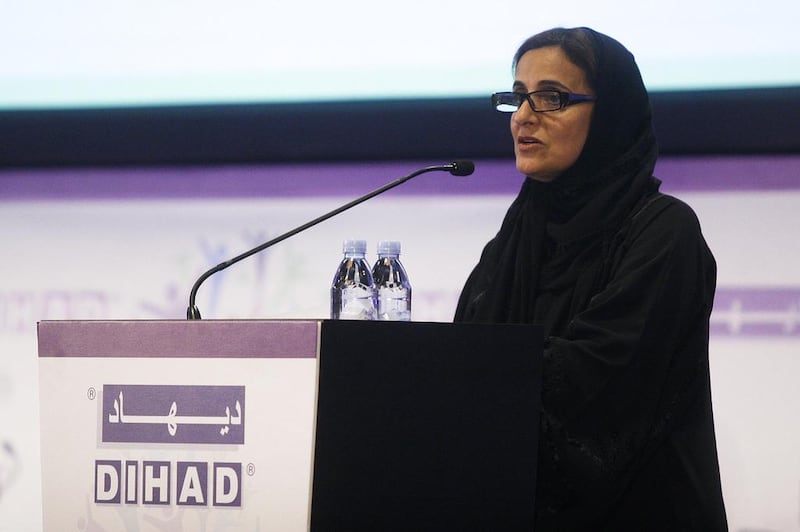DUBAI //
With an increasing number of refugees and complex aid situations in the region, and an urgent need for a sustainable solution, Sheikha Lubna Al Qasimi said Masdar was currently working on developing clean energy solutions.
“With solar power increasing at such rapid rates, it will only be a matter of time until solar energy can be used to solve problems in emergency operations, schools, refugee camps and hospitals,” she said at the opening of the Dubai International Humanitarian Aid and Development Conference (Dihad) in Dubai on Tuesday. “This is the type of innovation that we all are looking forward to at Dihad this time. Innovation is the key to finding solutions to the most complex aid situations.”
She said aid communities faced a common problem of how to provide relief to the needy in increasingly complex situations and she was working with her team to solve it.
“To a certain degree, innovation has become an overused buzzword but it can be heard expressed with equivalent enthusiasm in boardrooms, universities, NGO offices and other environments alike,” Sheikha Lubna said. “The UAE Government have been mobilised to encourage innovation by providing the environment and resources to think innovatively. I am responsible for making this happen at the Ministry of International Cooperation and Development.
She said Masdar was working on solutions, especially as climate change was increasingly leading to natural disasters and environmental hazards.
This year’s Dihad theme will focus on opportunity, mobility and sustainability in humanitarian aid and development.
“In the same way that this theme will enable Expo 2020 to become a springboard for inaugurating a progressive and sustainable vision, it aims to stimulate thought and dialogue for the sustainable development goals, climate change, disaster reduction, renewable energy, humanitarian logistics and forced displacement,” Sheikha Lubna said. “It is my hope that discussions and outcomes from Dihad will feed into the World Humanitarian Summit in Turkey next year.”
Princess Haya bint Al Hussein, UN Messenger of Peace and wife of Sheikh Mohammed bin Rashid, Vice President and Ruler of Dubai, said more work needed to be done.
“Last year I visited refugee camps in Ethiopia,” she said. “The situation was shocking. More than 90 per cent of refugees were women and children and most struggled across the border arriving on the edge of starvation. For these, there was no opportunity, no mobility and no sustainability.”
Prince Hassan bin Talal from Jordan questioned why every region in the world had a bank for reconstruction and development except the Middle East.
“The reality is that sovereign wealth fund managers have to develop a conscience in terms of human security of this region,” he said. “The correlation is not between development and sustainability in material terms, it is human dignity. The real security threat to our region is people who are the vectors of ideas, good or bad.”
By the end of 2013, the UN estimated there were more than 51 million people displaced due to warfare, violence and persecution, more than half of which were women and children.
“And here we are talking about democracy and citizenship,” Prince Hassan said. “The future is based on human dignity. I hope this meeting is not just about talking at each other but talking to each other, listening to each other and developing one more modest step of hope for those who are important – the millions who look at us and wonder what it is we are doing for the future generations.”
cmalek@thenational.ae






